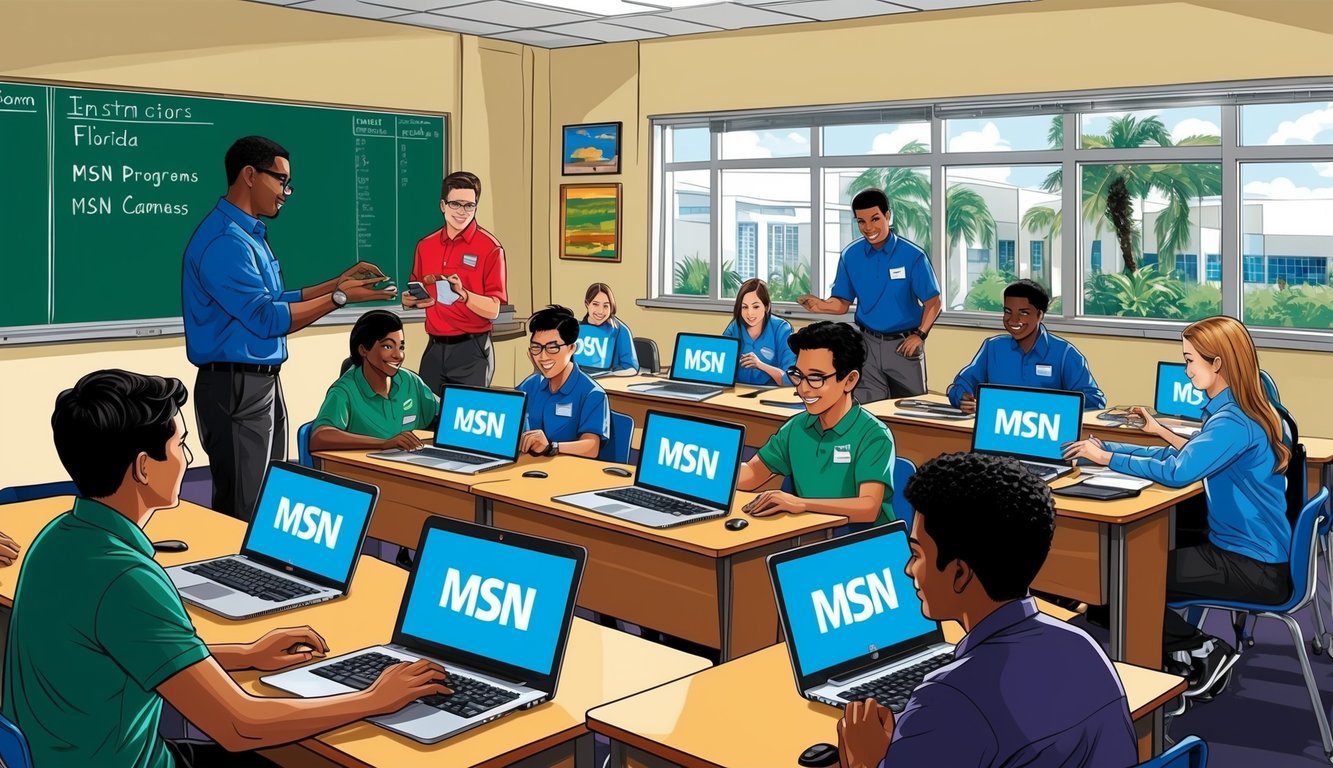If you’re considering advancing your nursing career, Florida offers some of the best MSN programs that can help you achieve your goals.
With multiple options available, including both online and campus-based formats, you can find a program that fits your lifestyle and aspirations.
Whether you want to specialize in nurse education, leadership, or healthcare simulation, there’s a path for you in the Sunshine State.
Understanding the admission requirements and the importance of accreditation is crucial when selecting a program.
Many institutions provide a range of specializations and studies tailored to enhance your existing nursing knowledge and skills.
With the right MSN degree, you can position yourself for leadership roles in healthcare and make a meaningful impact on patient care.
Exploring these opportunities can be overwhelming, but having the right information helps simplify the process.
With this guide, you will discover the best MSN programs in Florida and how they can open doors to new career prospects.
Key Takeaways
- Florida has a variety of accredited MSN programs to enhance your nursing career.
- Admission requirements vary by program, so it’s important to research thoroughly.
- An MSN degree can lead to advanced roles in nursing and healthcare leadership.
Overview of MSN Education

The Master of Science in Nursing (MSN) is a vital step for nurses aiming to advance their careers.
It provides specialized knowledge and skills necessary for higher-level roles in healthcare.
Understanding the importance of an MSN degree, its distinction from a BSN, and the various specialization tracks can help you make informed decisions for your career.
Importance of MSN Degree
An MSN degree allows you to take on advanced roles in nursing.
As healthcare becomes more complex, hospitals and clinics increasingly seek nurses with higher education.
With an MSN, you can pursue positions such as Nurse Practitioner, Clinical Nurse Leader, or Nurse Educator.
These roles come with greater responsibilities and often lead to higher salaries.
Moreover, many MSN programs offer training in leadership and healthcare management.
This training prepares you to affect change in healthcare settings, ensuring better patient outcomes and more effective operations.
MSN vs BSN Degree
The Bachelor of Science in Nursing (BSN) and MSN are different in both education and career potential.
| Feature | BSN Degree | MSN Degree |
|---|---|---|
| Duration | 4 years | 1-2 years* |
| Focus | General nursing skills | Advanced practice and specialties |
| Career Opportunities | Staff nurse, RN | Nurse Practitioner, Manager |
| Salary Potential | Lower | Higher |
*Duration varies based on full-time or part-time study.
While the BSN prepares you for basic nursing roles, the MSN equips you for advanced practice.
An MSN also opens doors for earning professional certifications in specialized fields.
MSN Specialization Tracks
Specialization tracks in MSN programs allow you to focus on specific areas of nursing.
Here are some popular tracks available:
- Family Nurse Practitioner (FNP): Manages patient care across the lifespan.
- Psychiatric-Mental Health Nurse Practitioner (PMHNP): Focuses on mental health diagnoses and treatment.
- Nurse Anesthetist (CRNA): Specializes in administering anesthesia and managing perioperative care.
Choosing a specialization can significantly impact your career path.
Each track not only influences the type of work you do but also the settings where you may practice.
The right specialization can lead to fulfilling job opportunities in healthcare.
For more information on MSN programs, you can explore NursingProcess.org or NurseJournal.org.
Admission Requirements and Accreditation

When considering MSN programs in Florida, understanding the admission requirements and accreditation standards is crucial.
These elements help ensure that you receive quality education and fulfill the necessary criteria to pursue advanced nursing roles.
Essential Admission Criteria
To apply for an MSN program in Florida, you will need to meet several essential criteria.
Generally, the following requirements apply:
- Bachelor’s Degree: You must hold a Bachelor of Science in Nursing (BSN) from an accredited institution.
- RN License: A current and valid Registered Nurse (RN) license in Florida is mandatory.
- GPA Standards: Many programs require a minimum GPA, often around 3.0 in the last 60 credits.
- Prerequisite Courses: Completion of specific courses, such as undergraduate statistics, is often necessary.
Application components typically include:
- Letters of Recommendation: Usually, 2-3 letters are needed from professional references.
- Personal Statement: This should outline your career goals and reasons for pursuing the MSN degree.
Accreditation Standards
Accreditation plays a vital role in ensuring that your MSN program meets high educational standards.
The most recognized accreditation bodies for nursing programs are:
- CCNE: The Commission on Collegiate Nursing Education evaluates and accredits nursing education programs.
- ACEN: The Accreditation Commission for Education in Nursing also provides accreditation.
Your MSN program should be accredited by one of these organizations.
This ensures that the program’s curriculum and faculty meet established benchmarks.
Florida Board of Nursing Guidelines
The Florida Board of Nursing sets specific guidelines that MSN programs must follow.
It is essential that your chosen program adheres to these standards.
Key aspects include:
- Curriculum Compliance: Programs should align with state regulations and educational requirements.
- Clinical Practice: Sufficient clinical training and hours are mandated to ensure practical experience.
You can find detailed information on the Florida Board of Nursing’s requirements on their official website, which is a helpful resource as you navigate your educational path.
Types of MSN Programs

When exploring MSN programs in Florida, you will find various formats to fit your lifestyle and career goals.
The options range from traditional, on-campus programs to flexible online formats.
There are also accelerated paths and direct entry options designed for those with different backgrounds.
Traditional and Online MSN Programs
Traditional MSN programs are typically offered on-campus.
These programs provide structured, face-to-face learning and may enhance networking opportunities with peers and professionals.
You can interact directly with instructors and participate in hands-on clinical experiences, essential for nursing education.
In contrast, online MSN programs like those at the University of Central Florida allow for greater flexibility.
You can balance your studies with work or personal commitments.
Many online programs use advanced technology to facilitate learning, providing resources like virtual simulations and online discussions.
Accelerated Options and Direct Entry MSN
Accelerated MSN programs are designed for students who already hold a bachelor’s degree in a different field and wish to switch to nursing quickly.
These programs shorten the time required to earn an MSN, often completing in as little as 12-18 months.
Direct Entry MSN programs cater to individuals with a non-nursing bachelor’s degree.
They combine nursing theory with clinical practice, allowing you to enter the nursing profession as you complete your master’s degree.
These options are particularly beneficial if you’re eager to start a nursing career without first earning a BSN.
Career Advancement and Leadership

In the nursing field, advancing your career can open doors to various leadership roles that hold significant responsibility and impact.
This section focuses on important roles you can aspire to within nursing leadership and management, the preparation needed for nurse educators, and opportunities in executive roles.
Roles in Nursing Leadership and Management
As you pursue an MSN, you can step into leadership roles like Nurse Manager, Director of Nursing, or Chief Nursing Officer.
These positions require strong decision-making skills and the ability to lead teams effectively.
Responsibilities often include:
- Staff Management: Overseeing nursing teams and ensuring quality patient care.
- Budgeting: Managing financial resources for nursing departments.
- Policy Development: Creating policies that enhance patient safety and care delivery.
These roles are crucial in shaping healthcare environments and directly affecting patient outcomes.
Programs like those at Florida Atlantic University focus on developing these competencies.
Preparing Nurse Educators
If you choose a path as a Nurse Educator, you will play a vital role in shaping the next generation of nurses.
The curriculum typically includes advanced theories and teaching methodologies.
As a Certified Nurse Educator (CNE), you will:
- Create Educational Plans: Designing courses that meet educational standards.
- Mentor Students: Providing guidance and support to nursing students.
- Evaluate Learning: Assessing student performance through various evaluation methods.
Acquiring this expertise through an MSN program prepares you to influence the nursing field significantly.
Institutions, such as those in Florida State University, offer specialized training for aspiring nurse educators.
Executive Roles in Healthcare Administration
Executive roles in healthcare administration are crucial for those looking to take on broader organizational responsibilities.
As a Health Care Administrator, you may oversee entire departments or facilities, requiring skills in both leadership and business.
Key responsibilities often include:
- Strategic Planning: Setting goals and strategies to improve healthcare services.
- Compliance Management: Ensuring that healthcare practices meet regulations and standards.
- Collaboration: Working with other leaders to optimize operations and patient care.
These positions, including Director of Nursing and other managerial roles, require strong leadership and a deep understanding of the healthcare landscape.
Top programs focus on these competencies to prepare you for success.
Applying MSN Knowledge to Practice

Your education in an MSN program equips you with vital skills to enhance patient care and healthcare delivery.
By focusing on evidence-based practices, improving healthcare quality, and fostering interprofessional collaboration, you can significantly impact your practice and the broader health community.
Evidence-Based Practice and Management
You will learn the fundamentals of evidence-based practice (EBP), which is essential for making informed clinical decisions.
EBP combines clinical expertise, patient values, and the best available research.
This approach ensures that patients receive the most effective and current treatments.
In your role, you should:
- Assess research findings critically.
- Integrate relevant studies into your practice.
- Encourage a culture of inquiry within your team.
Using EBP can improve patient outcomes and reduce variations in care, leading to a higher standard of practice.
Healthcare Quality, Safety, and Policy
Understanding healthcare quality and safety is crucial in your practice.
You will explore various frameworks and policies that promote safe and effective patient care.
Your training will focus on identifying areas for improvement and implementing strategies to enhance care quality.
Key elements include:
- Understanding quality measures like patient satisfaction and safety indicators.
- Learning about national and local health policies that affect nursing practice.
- Utilizing quality improvement tools, such as Plan-Do-Study-Act (PDSA) cycles.
These skills will enable you to contribute positively to health systems, ensuring patient care is both safe and efficient.
Interprofessional Collaboration and Patient Care
Effective interprofessional collaboration is vital for successful patient care outcomes.
You will learn how to work with various healthcare professionals to create holistic care plans.
This teamwork enhances communication and fosters a shared responsibility for patient health.
Focus on these aspects:
- Building trust and rapport with colleagues from diverse disciplines.
- Engaging in team meetings and care discussions.
- Advocating for patients’ needs across different care settings.
By promoting collaboration, you contribute to a comprehensive approach to healthcare, where all team members work together for the patient’s best interest.
Combining these skills you gain from your MSN program can lead to significantly improved patient care and outcomes.
Frequently Asked Questions
In this section, you can find answers to essential questions about Master of Science in Nursing (MSN) programs in Florida.
This will help you understand the options available, accreditation, program formats, potential earnings, and career outcomes by specialization.
What are the top-ranked MSN programs available in Florida?
Florida boasts several highly regarded MSN programs.
Some of the top-ranked options include:
| University | Program Highlights |
|---|---|
| Florida Atlantic University | Adult/Gerontological Nurse Practitioner, Family Nurse Practitioner |
| Florida International University | Nurse Educator, Adult-Gerontology Primary Care Nurse Practitioner |
| Florida State University | Nursing Education, Artificial Intelligence in Nursing |
You can explore more details about these programs at NursingProcess.org.
Which MSN programs in Florida are fully accredited?
Accreditation is crucial for ensuring the quality of your education.
Many MSN programs in Florida are accredited by recognized bodies, such as the Commission on Collegiate Nursing Education (CCNE) or the Accreditation Commission for Education in Nursing (ACEN).
Before applying, verify the program’s accreditation status through its official website or NurseJournal.
Are there Direct Entry MSN programs available for non-nurses in Florida?
Yes, several schools in Florida offer Direct Entry MSN programs for individuals without a nursing background.
These programs allow you to advance into the nursing field by combining foundational nursing education with advanced practice.
You can research specific schools that offer this option to find the right fit for your career goals.
What online options are available for pursuing an RN to MSN program in Florida?
Many institutions in Florida provide online RN to MSN programs.
These programs offer flexibility while allowing you to advance your education.
Some examples include:
| University | Online Program Options |
|---|---|
| Florida State University | Nursing Education, Administration |
| Florida International University | Various specializations available online |
Check individual program details for specific requirements and availability.
How much can a graduate with an MSN expect to earn in Florida?
Graduates with an MSN in Florida can expect competitive salaries.
On average, MSN-holders earn between $80,000 and $120,000 annually, depending on specialization and experience.
You can consult resources like the U.S. Bureau of Labor Statistics for more detailed information on nursing salaries in your area.
What are the differences in career outcomes between various MSN specializations?
Career outcomes can vary significantly depending on your chosen MSN specialization.
Here are a few common paths:
| Specialization | Career Roles |
|---|---|
| Family Nurse Practitioner | Primary Care Provider, Clinic Manager |
| Nurse Educator | Nursing Instructor, Academic Coordinator |
| Nurse Administrator | Health Services Manager, Director of Nursing |
Researching these specializations will help you align your career goals with the right educational path.

